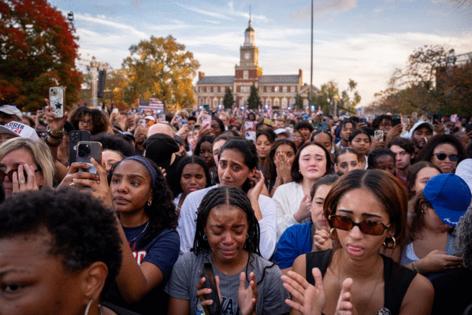Commentary: I spoke to college students after the election. Here's how to make them care more about politics
Published in Op Eds
We are a few weeks removed from the election, and Democrats do not appear to be any closer to truly understanding why they lost so much ground to Donald Trump with so many demographics. It’s clear to me that comprehending what happened and why will have to come from somewhere other than political operatives within the party, cable news media elites, the dumpster fire that is social media or pollsters.
As luck would have it, after the election I found myself giving a lecture to between 40 and 50 students at an American University media and public policy class. For all the discussion about younger voters and trying to understand what motivates them to head to the polls, I wonder how many of the pundits, commentators and experts dissecting the election have actually had a conversation with anyone under age 25 about it.
So there I was speaking to a room full of young adults, under 25, some from Alabama or West Virginia, others from Germany or Pakistan, many having voted in the election — most shocked, even shaken from the results.
Interestingly, two young women from Pakistan, who had not voted, were least surprised by the outcome. They had a front-row seat to prejudice in America, having lived in New York in the aftermath of 9/11, the victims of threats, hatred and law enforcement targeting. They scoffed at anyone just waking up to the reality that the electorate was not persuaded by warnings of sexism, racism or misogyny. For them and their families, those factors were embedded in their lived experience as Americans.
A number of students who attended some of Vice President Kamala Harris’ campaign rallies were surprised that the very real, tangible energy they felt at those events did not translate to the end result. They felt that they had immersed themselves in a bubble of lefty jubilance and were blindsided when they realized that bubble wasn’t as large as they thought.
As the conversation unfolded, I was surprised that the topic of the Middle East never came up as a reason to support or oppose Harris. For all the talk leading up to the election about the effect the Israel-Hamas conflict would have on younger, more progressive college voters, it didn’t come up at all in this sample.
What did come up was the feeling that Harris’ pivot to the middle wasn’t authentic. Her talking about her own gun ownership, for example, felt like a blatant effort to appeal to the center-right, and they just didn’t buy it.
Harris’ loss hit the young women the most. So many of them didn’t understand how so many in this country could knowingly vote for a man and a political party that want to take away their rights and control their bodies. I challenged them to raise their hands if they, with any regularity, talk with the men in their lives about their bodies, about their menstrual cycles, about what it is to experience life as a woman. I asked them how many times the men in their lives — their fathers or partners — proactively broach those topics with them. Not one hand was raised. Given that, I asked, why would you think that any of them would vote one way or the other based on what’s going on with your body?
Another reccurring criticism of Harris was the inability or refusal to meaningfully distinguish what she would have done differently from President Biden. I’ll admit, I was surprised to hear this specific point mentioned numerous times. They felt that the whole premise of the Harris campaign was a fresh start, a new generation of leadership, a turning of the page from old to new and yet, by not contrasting at all from Biden, she was sending the signal to these kids that it would be business as usual. They found that incredibly uninspiring.
As I spent these few hours with them, it was clear that these students feel unseen by the political system. It was an overwhelmingly pro-Harris class, but the disdain they felt for the Democratic Party was palpable. This generation doesn’t want to be told what to do or what to think. They don’t want to be told what could happen if the other side wins. They don’t want to be lectured to or preached at. What they do want is to be inspired. They want something different from what they’ve seen from Washington over the last eight years. They want to be engaged regularly and authentically, not just when the political calendar dictates, as some targeted demographic determined by a political consultant.
Every election cycle, everyone asks how to get young Americans to turn out more robustly, to engage and activate. After talking with these students, I think the answer is simple: Engage them like adults. Talk to them, not at them. Be real. Make it relatable and personal. Meet them where they are, not where you want them to be.
____
Kurt Bardella is a contributing writer for Opinion and a NewsNation political contributor. X/BlueSky:@KurtBardella; Instagram/Threads/Substack:@KurtTakes
©2024 Los Angeles Times. Visit at latimes.com. Distributed by Tribune Content Agency, LLC.




























































Comments